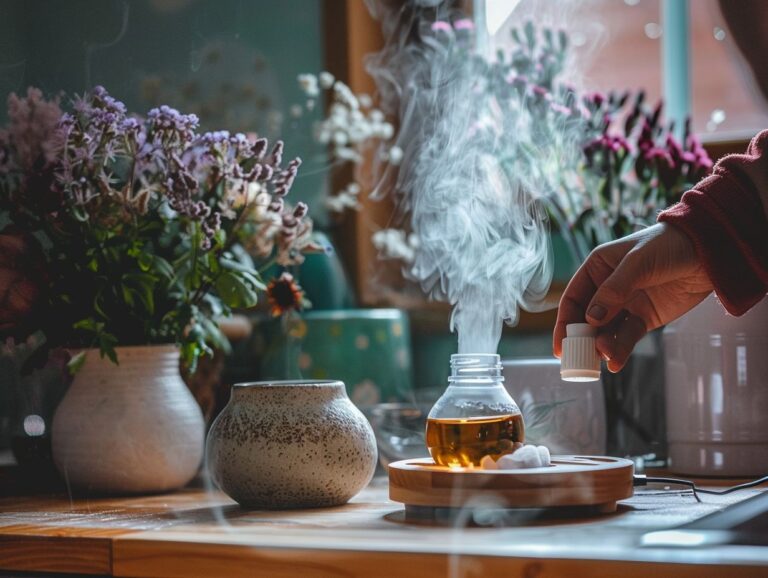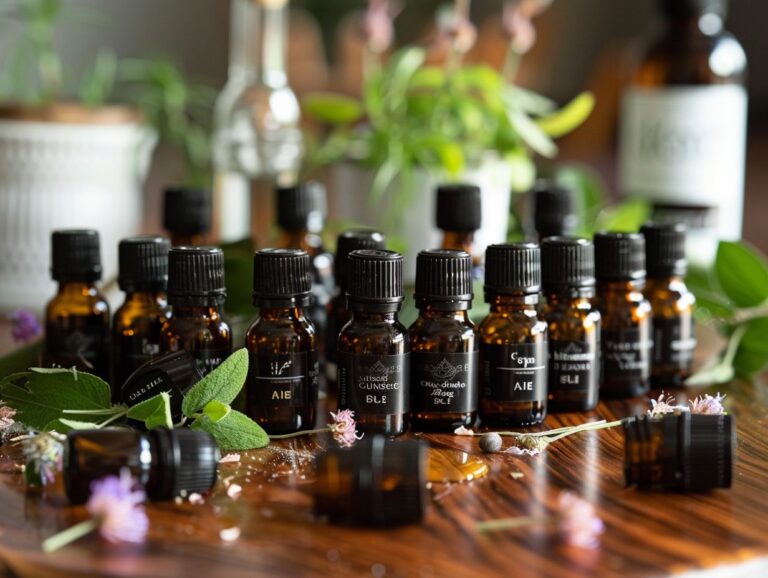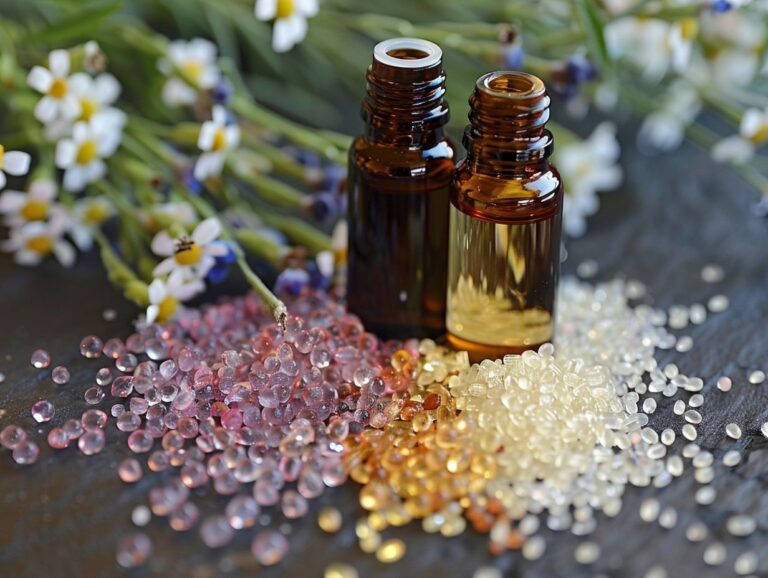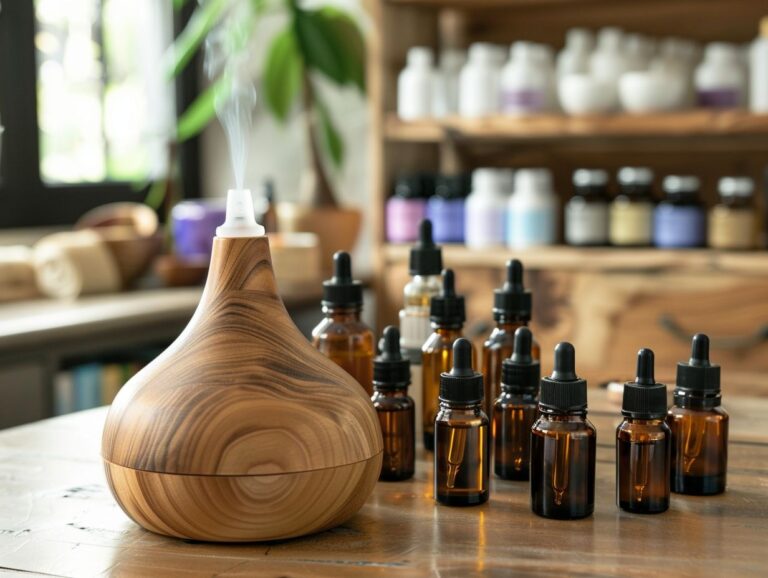Why You Shouldn’t Use Essential Oils
Essential oils have gained popularity for their various benefits, from aromatherapy to natural cleaning products.
It’s important to be aware of how bad essential oils can be.
This article will explore the different methods of using essential oils, their benefits, and the potential risks, such as allergic reactions and ingestion dangers.
We will discuss why it’s crucial to avoid using essential oils on children and pets.
Find out more about the regulations surrounding essential oils and alternative options to consider.
Key Takeaways:
What Are Essential Oils?
Essential oils are highly concentrated plant extracts that retain the natural smell and flavor, or ‘essence,’ of their source. These oils are commonly used in aromatherapy, a holistic healing treatment that aims to improve physical, mental, and emotional well-being.
These oils have been utilized for centuries in various cultures for their therapeutic properties. Originating from ancient practices such as Ayurveda in India and Traditional Chinese Medicine, essential oils gained popularity in the Western world in recent decades.
Extraction methods for essential oils vary depending on the plant source, with common techniques including steam distillation, cold pressing, and solvent extraction.
Essential oils are known for their potential health benefits, ranging from mood enhancement and stress relief to immune system support and skin care. Diffusing essential oils, applying them topically, or using them in bath rituals are popular methods of incorporating these oils into daily wellness routines.
How Are Essential Oils Used?
Essential oils can be used in various ways, including topical application, ingestion, and diffusing. Caution must be exercised, especially with ingestion and direct skin contact, as improper use can lead to adverse reactions.
In terms of topical application, it is important to dilute the essential oils properly with a carrier oil to avoid skin irritation or sensitization. Ingesting essential oils should only be done under the guidance of a qualified professional, as some oils can be toxic if consumed internally.
Diffusing essential oils is a popular method for enjoying their therapeutic benefits through inhalation. Diffusers disperse the oils into the air, creating a pleasant aroma that can promote relaxation and emotional well-being. are essential oils harmful.
It’s essential to follow safe usage guidelines for each method to prevent any negative effects. Extra caution should be taken when using essential oils around children and pets, as their bodies may react differently to the oils. Consultation with a healthcare provider or aromatherapist is recommended to ensure safe and effective use of essential oils.”
What Are the Different Methods of Using Essential Oils?
The various methods of using essential oils include dilution for safe topical application, diffusing for aromatherapy benefits, and direct topical application for targeted effects on the skin.
When diluting essential oils for topical use, it’s crucial to follow recommended guidelines to avoid skin irritation or sensitization. A general rule of thumb is to use a carrier oil like almond or coconut oil to dilute essential oils, with a common ratio being 2-3 drops of essential oil per teaspoon of carrier oil. This ensures proper absorption by the skin while minimizing any adverse reactions.
Diffusing essential oils is an excellent way to enjoy their therapeutic benefits through inhalation. Whether using a diffuser, steam inhalation, or simply adding oils to a bowl of hot water, this method can help promote relaxation, improve focus, or even purify the air in your surroundings.
For direct topical applications, it’s important to patch test a small amount of diluted oil on the skin before wider use. Always avoid sensitive areas like the eyes, mucous membranes, or broken skin. Certain essential oils like lavender, tea tree, and peppermint are versatile options that are well-suited for both dilution and diffusion methods.
What Are the Benefits of Essential Oils?
Essential oils offer a range of benefits, from promoting relaxation and stress relief through aromatherapy to supporting skin health and natural cleaning with their antimicrobial properties.
Specific oils like lavender and tea tree oil are known for their diverse applications in the realm of essential oils.
Lavender, with its calming and soothing properties, is popular in aromatherapy to ease anxiety and improve sleep quality. On the other hand, essential oils dangers, tea tree oil is valued for its powerful antibacterial and antifungal properties, making it a staple ingredient in skincare products for treating acne and other skin conditions.
When utilized in natural cleaning solutions, these oils not only offer a pleasant aroma but also effectively disinfect and purify the environment. This versatility in usage further underscores the remarkable benefits of incorporating essential oils into daily routines.
Aromatherapy
Aromatherapy, a popular use of essential oils, harnesses the power of aromatic compounds to enhance both physical and emotional well-being through inhalation or topical application.
Studies suggest that certain essential oils such as lavender, chamomile, and bergamot are widely recognized for their calming properties, helping to induce relaxation and reduce anxiety levels. On the other hand, invigorating oils like peppermint, rosemary, and eucalyptus are known for their refreshing and stimulating effects, which can uplift mood and increase alertness. Find out why essential oils can be harmful if not used properly.
Whether using essential oils in a diffuser, adding them to a bath, or blending them with carrier oils for massage, the application method can greatly impact their effectiveness. Inhalation through diffusion allows for quick absorption, while topical application through massage offers both physical and emotional benefits.
Skin Care

These essential oils contain powerful anti-inflammatory and antimicrobial properties that can help reduce redness, swelling, and irritation caused by conditions like eczema, psoriasis, and dermatitis. Additionally, lavender oil is known for its calming effects, making it beneficial for stress-induced skin issues.
When using essential oils topically, it is crucial to properly dilute them with a carrier oil like coconut or jojoba oil to prevent skin irritation or sensitization. The general rule of thumb is to use a 2% dilution, which equates to about 12 drops of essential oil per ounce of carrier oil.
Natural Cleaning Products
Essential oils are key ingredients in natural cleaning products due to their antimicrobial, antifungal, and antibacterial properties, making them effective alternatives to harsh chemicals.
These potent oils not only cleanse but also leave a fresh, pleasant scent in the environment. Known for their ability to eliminate germs, essential oils like tea tree and lavender are popular choices for eco-friendly cleaning. When mixed with other natural ingredients such as vinegar and baking soda, these oils can create powerful cleaning solutions that are safe for both people and the environment.
- DIY recipe: Mix 1 cup of water, 1/2 cup of white vinegar, 10 drops of tea tree oil, and 10 drops of lavender oil in a spray bottle for a versatile cleaning spray.
While using essential oils in cleaning, it’s important to remember that they are highly concentrated and should be handled with care. Always dilute them properly, keep them away from pets and children, and test a small area before using them on surfaces to ensure compatibility.
What Are the Risks of Using Essential Oils?
While essential oils offer numerous benefits, there are inherent risks associated with their use, such as allergic reactions, skin irritations, and potential toxicity if ingested improperly.
It is crucial to perform a patch test before applying any essential oil topically to check for allergic reactions. Diluting essential oils with a carrier oil, such as coconut or almond oil, can help reduce the risk of skin sensitivities. Avoiding the ingestion of essential oils unless under the guidance of a qualified practitioner is highly recommended, as some oils can be toxic if consumed. It’s important to keep essential oils out of reach of children and pets to prevent accidental ingestion. In case of adverse reactions like difficulty breathing or severe skin irritation, seek medical help immediately.
Allergic Reactions
Allergic reactions to essential oils can manifest as skin rashes, respiratory symptoms, or even systemic responses in severe cases, highlighting the importance of patch testing and proper dilution.
It is crucial to be aware that some essential oils, such as lavender and tea tree, are more likely to cause allergic reactions due to their potent nature. Symptoms of an allergic reaction may include itching, redness, swelling, hives, or difficulty breathing.
- Individuals with a history of skin sensitivities or allergies are at a higher risk of reacting to essential oils.
- When experiencing an allergic reaction, immediately discontinue use of the oil and seek medical advice.
- Managing allergic reactions involves washing the affected area, applying a soothing, fragrance-free lotion, and keeping the skin moisturized.
Skin Irritation
Skin irritation from essential oils can range from mild redness to severe burns, emphasizing the need for proper dilution guidelines and spot testing before widespread application.
One common cause of skin irritation is improper dilution of essential oils. It’s crucial to follow recommended dilution ratios to minimize the risk of adverse reactions. Typically, a safe dilution ratio for adults is 2-3 drops of essential oil per teaspoon of carrier oil.
Another factor contributing to skin irritation is sensitivity to specific compounds in essential oils dangers. For instance, citrus oils like lemon or lime are photosensitive and may cause skin reactions when exposed to sunlight.
When choosing a carrier oil, opt for gentle options like jojoba, coconut, or sweet almond oil, which are less likely to trigger skin sensitivities. In case skin irritation occurs, immediately wash the affected area with mild soap and water, and apply a soothing, unscented lotion or aloe vera gel to calm the skin.
Ingestion Dangers
Ingesting essential oils can pose serious health risks, as these concentrated extracts may be toxic when consumed internally. It is crucial to understand the differences between edible and therapeutic-grade oils.
When essential oils are ingested improperly, they can cause poisoning due to their high potency. The liver and kidneys can also suffer from organ damage as they attempt to metabolize these powerful substances. The sensitive digestive system can be adversely affected, leading to issues such as stomach pain, nausea, and diarrhea.
To avoid these potential dangers, it is recommended to seek guidance from a qualified healthcare professional before considering internal use. They can provide personalized advice based on individual health conditions and ensure safe practices.
Interactions with Medications

For instance, the popular essential oil, lavender oil, may interact with sedative medications, such as benzodiazepines, causing excessive drowsiness or dizziness. Similarly, citrus oils like bergamot oil can make the skin more sensitive to sunlight, which may be problematic for individuals taking photosensitive medications. Eucalyptus oil is known to potentially trigger asthma symptoms in some individuals, emphasizing the need for caution among asthma patients.
Consulting a healthcare provider before using essential oils, especially for those with underlying health conditions or taking medications, is crucial to avoid any negative outcomes. It is essential that individuals inform their doctors about their use of essential oils to ensure safe and effective treatment plans.
Why You Shouldn’t Use Essential Oils on Children and Pets
Special care should be taken when using essential oils around children and pets, as their sensitive systems can react differently to these potent substances, potentially leading to adverse effects.
Children and pets have a higher risk of experiencing adverse reactions to essential oils due to their smaller size and developing respiratory systems. It is crucial to avoid oils rich in phenols such as oregano, thyme, and cinnamon, as they can be especially irritating. Instead, opt for gentle oils like lavender, chamomile, and frankincense when diffusing or using around young ones or furry friends. Always dilute essential oils appropriately and ensure good ventilation in the room to minimize any potential risks.
Children
Essential oils should be used cautiously around children, especially infants and young toddlers, as their developing systems may be more susceptible to adverse effects. Dilution is key when using oils on children.
When using essential oils on children, it is crucial to follow age-appropriate dilution ratios to ensure safety. It is recommended to consult with a healthcare professional or a certified aromatherapist to determine the correct dilution for your child’s age and individual needs.
- Safe application methods, such as diffusing oils in well-ventilated areas or applying topically with carrier oils, can help minimize the risks associated with direct contact.
- It is essential to avoid certain oils, such as peppermint and eucalyptus, which may be too strong for children’s sensitive systems and could potentially cause respiratory issues or skin irritations.
Pets
Pets, particularly cats and dogs, can be sensitive to essential oils, which may cause adverse reactions or toxicity. It is essential to be aware of pet-specific guidelines and consult with veterinarians.
A common mistake pet owners make is assuming that what’s safe for humans is safe for their furry companions. Certain essential oils, such as tea tree, citrus, and peppermint, can be toxic to pets when inhaled or ingested, leading to symptoms like vomiting, tremors, or even seizures. When creating a pet-friendly environment, opt for pet-safe alternatives like lavender, chamomile, or frankincense.
Are Essential Oils Regulated by the FDA?
Essential oils are not directly regulated by the FDA for their therapeutic or aromatic properties. They may fall under FDA regulations if marketed for specific medical or cosmetic claims.
In terms of regulatory oversight, the FDA primarily focuses on ensuring the safety and quality of essential oils. This means that manufacturers need to adhere to good manufacturing practices to guarantee the purity and consistency of their products. Labeling requirements are also crucial, with FDA mandating that essential oils should be properly labeled with ingredients, directions for use, and any potential warnings or contraindications. Strict restrictions are in place regarding the types of health claims that can be made about essential oils to prevent misleading consumers and ensure transparency.
What Are the Alternatives to Essential Oils?
For individuals sensitive to essential oils or seeking alternative remedies, there are various non-aromatic options available, such as herbal supplements, plant extracts, or traditional medicines.
Herbal supplements, known for their natural properties, have been used for centuries to promote overall well-being and support the body’s innate healing processes without relying on strong scents.
Plant extracts like aloe vera, chamomile, or calendula offer skin-soothing benefits and can be gentle on sensitive individuals.
Traditional medicines, backed by cultural practices and historical use, provide a wealth of potential remedies for various ailments, catering to those who prefer non-aromatic solutions. Exploring these diverse alternatives can offer relief and comfort to those who need options beyond essential oils.
Frequently Asked Questions
Why should I avoid using essential oils?
Essential oils can be harmful when used incorrectly or in excess. They can cause skin irritation, respiratory issues, and even interact with certain medications.
Are essential oils safe for everyone to use?
No, essential oils should not be used by pregnant or nursing women, children, or individuals with certain health conditions. Always consult with a healthcare professional before using essential oils.
Can essential oils be ingested?
No, ingesting essential oils can be dangerous and should only be done under the supervision of a trained healthcare professional.
Are all essential oils created equal?
No, quality and purity of essential oils can vary greatly. It’s important to research the brand and source of essential oils before using them.
Can essential oils be used in place of medication?
No, essential oils should not be used as a substitute for prescribed medication. They can be used as a complementary therapy, but always consult with a healthcare professional before making any changes to your treatment plan.
Are essential oils regulated by the government?
No, essential oils are not regulated by the government. This means that the quality and safety of essential oils are not guaranteed, and it’s important to do your own research and purchase from reputable sources.








